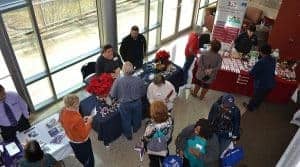Dementia Update Educates Health Care Professionals, Caregivers
| Dec. 12, 2017 | If nothing improves in dementia care in the next three decades, then by 2050 taking care of people with dementia will cost $1 trillion annually in the United States, a guest speaker warned Dec. 2 during the Dementia Update conference at UAMS.

Lyketsos, M.D., left, visits with Mark Pippenger, M.D., whose presentation preceded his at the Dementia Update.
That speaker, Constantine Lyketsos, M.D., professor of psychiatry and behavioral sciences at Johns Hopkins University in Baltimore, Maryland, along with other health professionals at the update sought to educate the physicians, nurses, pharmacists, dietitians, social workers and caregivers about dementia and how to improve care for patients.
Lyketsos also was the founding director of the Johns Hopkins Neuropsychiatry Service, which he led for over a decade, and is a world expert in the care and treatment of patients with Alzheimer’s disease and related dementias, especially those with behavioral and psychological symptoms of dementia.
Mark Pippenger, M.D., associate clinical professor in the UAMS College of Medicine Donald W. Reynolds Department of Geriatrics, introduced Lyketsos, then gave the audience of about 80 an overview of what dementia is and the most common causes of it.

Attendees at the Dementia Update visit with vendors in the lobby of the I. Dodd Wilson building during a break in the conference.
In order of prevalence, the causes include neurodegenerative disorders like Alzheimer’s disease, dementia with Lewy bodies, vascular dementia and fronto-temporal dementia (FTD).
Pippenger said Alzheimer’s disease usually happens in older people, and memory loss is usually the predominant symptom. Lewy body patients also are older, but they often have a loss of motor control like that found in Parkinson’s disease. Vascular dementia often results from a known stroke, and FTD comes with behavioral changes and odd affect as the frontal and temporal lobes degenerate.
“In every case, we should give them the best, most accurate diagnosis possible,” Pippenger said. “We should always stop those drugs that can make dementia worse. We frequently see people on drugs that are making things worse.”
Lyketsos in his opening remarks echoed Pippenger’s assessment, but spotlighted the issue of agitation in dementia patients and how best to treat it.
“My focus is on agitation because it is one of the most problematic behaviors,” Lyketsos said. “There are few drug options that are safe. I want you to think about how not to use drugs, and not to use drugs that are harmful.”
He said in 2010, there were 35 million people with dementia, and by 2030, that total will rise to 50 million worldwide. There is no drug even in development that will stop dementia in its tracks, and as a society, we are underinvesting in drug development and treatment for it, Lyketsos said.
The conference was the second annual Dementia Update to be presented by the Walker Memory Center at the UAMS Donald W. Reynolds Institute on Aging. Pippenger is a behavioral neurologist and sees patients at the Walker Memory Center.
Following the presentations from Pippenger and Lyketsos, speakers in other sessions covered topics including support services and resources for community members; training in screening and diagnosis for professionals; medications, safety and legal matters; and strategies for handling difficult behaviors.
